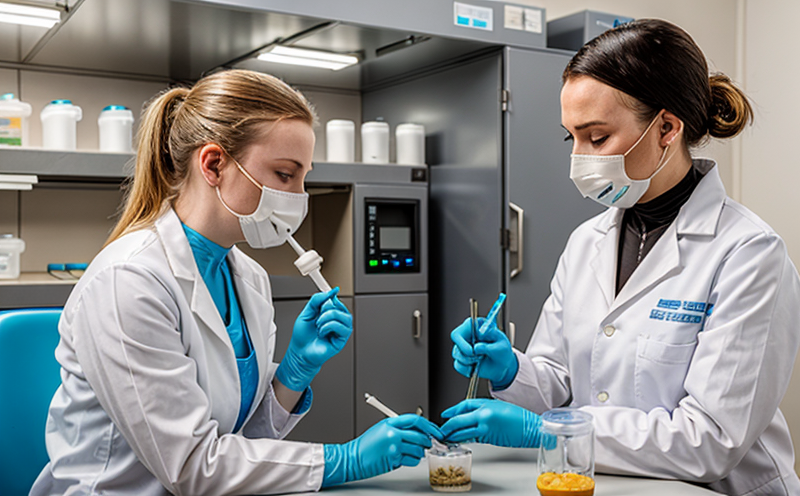FDA Compliance Program DON Detection in Wheat Products
The FDA Compliance Program for Deoxynivalenol (DON) detection in wheat products is a critical service ensuring that food and feed manufacturers adhere to strict regulatory standards. Deoxynivalenol, commonly known as vomitoxin, is a mycotoxin produced by certain fungi such as Fusarium species. This toxin can contaminate cereal crops like wheat during growth, harvest, or storage, posing significant health risks if consumed in high quantities.
The FDA sets limits for DON in various food and feed products to protect public health and ensure product safety. For instance, the limit for DON in wheat used as a human food ingredient is 1ppm (parts per million), while the limit for DON in wheat destined for animal feed can be higher but still regulated at 5ppm. These limits reflect the balance between maintaining product quality and ensuring that consumers are not exposed to harmful levels of this mycotoxin.
Our laboratory offers a comprehensive FDA Compliance Program designed specifically for DON detection in wheat products. This program ensures that all testing meets or exceeds the stringent requirements set by the FDA, providing peace of mind for manufacturers and suppliers. Our approach involves meticulous sample preparation, advanced analytical techniques, and rigorous quality control measures to deliver accurate results.
Our service includes:
- Comprehensive sample preparation tailored to wheat matrix
- Use of validated methods such as LC-MS/MS for precise quantification
- Regular calibration and validation of equipment
- Detailed reporting aligned with FDA guidelines
The testing process begins with proper sample collection, followed by thorough preparation to ensure the integrity of the sample. This includes homogenization and extraction methods that are critical for accurate quantification of DON in wheat products.
| Sample Preparation Steps | Description |
|---|---|
| Homogenization | Mixing the sample to achieve a uniform consistency |
| Extraction | Using solvents like acetonitrile for effective extraction of DON |
The extracted samples are then analyzed using Liquid Chromatography Tandem Mass Spectrometry (LC-MS/MS), a highly sensitive and accurate method that allows us to detect even trace amounts of DON. This technology provides reliable quantification data, which is essential for meeting regulatory requirements.
Our laboratory adheres strictly to ISO 17025 standards, ensuring the accuracy and reliability of our results. We also provide detailed reports that include all relevant information required by the FDA, such as limits of detection (LOD) and quantification (LOQ), along with statistical analysis of data.
By partnering with us for your FDA Compliance Program DON Detection in wheat products, you can rest assured that your products meet stringent regulatory standards. Our expert team will work closely with you to ensure compliance throughout the testing process.
Industry Applications
The FDA Compliance Program for DON detection in wheat is widely applicable across various sectors, including food processing, animal nutrition, and grain trading. Here are some key industry applications:
| Industry Sector | Description of Application |
|---|---|
| Food Processing | Detecting DON in wheat products to ensure compliance with FDA limits for human food ingredients. |
| Animal Nutrition | Monitoring DON levels in wheat destined for animal feed to comply with the higher but regulated limits set by FDA. |
| Grain Trading | Verifying DON content before and after trade transactions to ensure product integrity and regulatory compliance. |
In addition, our service is particularly beneficial for:
- R&D teams looking to identify potential contamination sources in wheat products
- Quality managers seeking detailed analysis of DON levels in wheat batches
- Compliance officers ensuring adherence to FDA regulations
Our comprehensive approach ensures that all stakeholders involved in the production and distribution of wheat-based products are aware of any potential contamination issues, allowing for timely corrective actions.
Environmental and Sustainability Contributions
The detection of DON in wheat plays a crucial role in environmental sustainability by preventing the spread of harmful mycotoxins. By identifying contaminated batches early on, we help minimize the release of DON into the environment during food processing or animal feed production.
- Reduction in Food Waste: Identifying DON contamination allows for proper disposal of affected wheat batches before they enter the market, reducing the amount of wasted product and minimizing environmental impact.
- Better Resource Management: Accurate detection helps optimize resource use by ensuring only uncontaminated wheat is used in production processes.
Our service also contributes to sustainable agriculture practices by aiding in the selection of less susceptible varieties of wheat and improving storage conditions to reduce fungal growth. By preventing the spread of DON, we support a more resilient agricultural sector that can better withstand environmental challenges.
Moreover, our commitment to precision and accuracy in testing ensures that only safe products reach consumers, thereby promoting healthier living standards and reducing healthcare costs associated with mycotoxin exposure.
Competitive Advantage and Market Impact
Adhering to FDA compliance for DON detection can provide significant competitive advantages in the wheat market. By offering reliable testing services, our clients gain a reputation for producing safe and high-quality products, which is crucial in maintaining customer trust.
- Premium Pricing: Products that meet strict regulatory standards often command higher prices due to their perceived safety and quality.
- Better Brand Reputation: A strong reputation for compliance can enhance brand image, attracting loyal customers and partnerships.
In addition to these benefits, our service helps clients stay ahead of regulatory changes. By ensuring that all testing meets or exceeds FDA requirements, we enable our clients to adapt quickly to new regulations without compromising product quality.
The ability to provide accurate and timely results also enhances operational efficiency, allowing companies to make informed decisions about production processes. This ensures that resources are used effectively, reducing costs associated with substandard products and potential legal issues arising from non-compliance.
Our service not only supports individual businesses but also contributes positively to the overall market by promoting transparency and trust among stakeholders. By ensuring that all players in the wheat supply chain adhere to FDA guidelines, we foster a more stable and reliable industry ecosystem.





